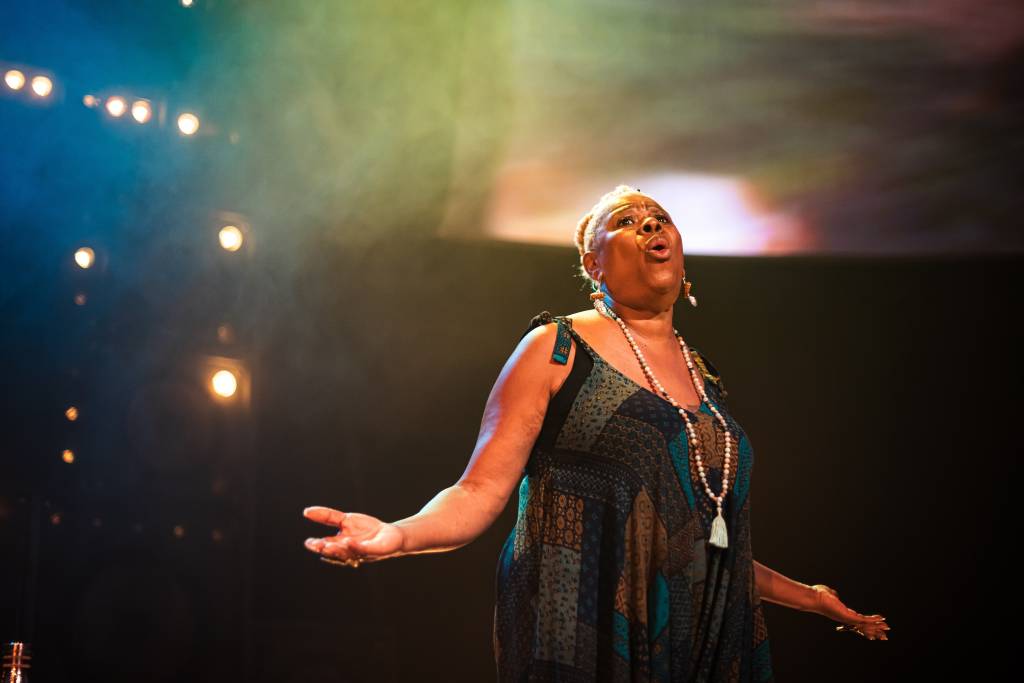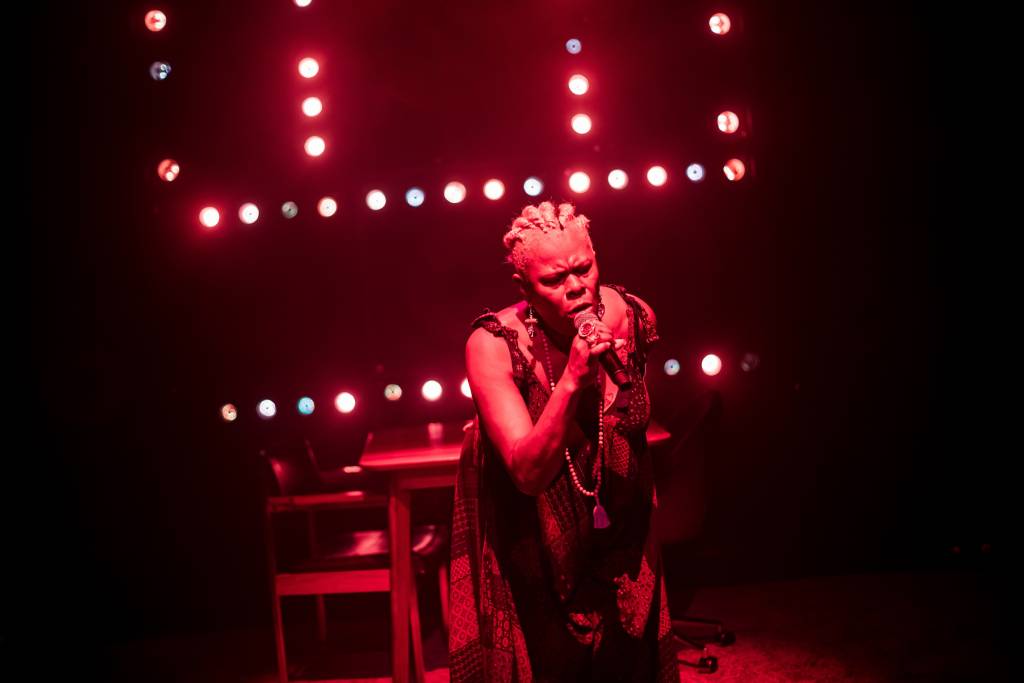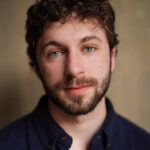
Coming to the Royal Court after a critically-acclaimed, sell-out Brixton debut, Hackney Showroom’s The Legends of Them is written and performed by award-winning actor and reggae star Sutara Gayle AKA Lorna Gee and directed by Jo McInnes.
We caught up with Gayle to find out more about taking the production to the Royal Court
Q&A with Sutara Gayle aka Lorna Gee
What is The Legends of Them about?
The Legends of Them is a story about my life, my spiritual journey, and the legends that helped to guide me. Growing up in Brixton, I had quite a colourful life, and it’s taken me to all different corners of the world. The play is about those experiences. Some good, some bad, some ugly. There’s pain, there’s passion, there’s laughter, and it’s all an amalgamation of that really.
What has the writing process been like?
I started writing this play ten years ago. It’s gone through many workshops, I wasn’t even going to be the one to write it at first. I was looking for a writer to write it. Nina from Hackney Showroom came onboard about seven years ago and said I should write it myself. At the time, I didn’t even know that I could write; The Legends of Them is the first full-length play I’ve written.
In writing this play, I wanted to pay homage to the people who have been the blueprint in my life: my mum, my sister, Nanny of the Maroons and my brother Mooji. Initially, I was always trying to distance myself from the story. I tried writing it as a fable, to incorporate fairy stories like Rumplestiltskin and Scrooge. But it wasn’t real. I was burying things. So I realised it had to be personal, and I had to face it head on.
What has the process of writing and performing your own story been like?
The process during rehearsals is sometimes difficult. It is hard, it’s painful. But it’s been very cathartic as well. Sometimes we carry around shame about our stories, and guilt, but once we allow ourselves to witness our stories, rather than finding ourselves inside of them, then we let ourselves off the hook. And that’s what I’m doing with this play, I’ve let myself off the hook. I’ve forgiven myself. I’ve embraced my younger self and asked my younger self to forgive me as well. Now I feel light, and that’s my hope for the audience too, to feel light, to claim their own story and stand in their power. It’s an invitation for them, in this way. I’ve written the play, but the action really happens in the room. We’ll be going through this experience together. I want it to free up the mind and make audiences feel light. If they can feel lighter, that, to me, would be a job well done.

Can you tell us about your family, who have inspired the show?
My mum was an extraordinary woman. She had eight of us. She grew us up by herself. She came over on the Windrush generation, and did so well. She was just so full of love. I’ve never, ever encountered anyone with such capacity to love through all the adversities that she was going through. She instilled this big capacity to love in all of her children and every single one of us, my brothers, my sisters, all of them and my nephews, her grandchildren, her great, great grandchildren. We all have the same temperament. My brother went on this spiritual journey in India and became a spiritual teacher. And when I started following his pointings, things really started to change for me.
Can you talk a bit more about your spiritual journey and the silent retreat you went on in India that your brother ran?
Initially, I thought I was just going on holiday with my brother. I thought ‘yeah, why not, I’ve never been to India before’. I packed baked beans, a ghetto blaster and high heel shoes, and he looked in my suitcase and went ‘what are you doing? Where do you think we’re going?’ He started taking everything out of my suitcase, going, ‘no, you don’t need that. You’re not going to need that’. It was hilarious. It was only when I got there, he said ‘you’re going to go on a silent retreat’.
I laughed. Who doesn’t talk? He said, ‘seriously, there’s no talking’. And you know what? It appealed to me, because up until then, I’d never been quiet before. I was always chatting, chatting, chatting. So I thought ‘this is a nice challenge. Let me see if I can do it.’ The first four days of that silent retreat, my mind was very noisy. Everything that I’d ever experienced started coming up in those first four days, all these people I hadn’t thought of in forty years started to appear. That’s what this play is based on. Then after the fifth day, things started to come quiet, and I realised a few things about myself. I was even able to breathe consciously, which I’ve never done before.
After the ten day silent retreat, I did a five day one and now I’ve done quite a few. I love them. The opportunity to not talk, to turn off the phone and go off grid is the most perfect thing ever. In life, we’re constantly consuming. But when you turn off the phone and go somewhere in nature and just don’t talk, when you’re in this quietness, it’s very powerful. You find a new you. If everyone in the whole world went on a silent retreat, the world would be a different place. There would be no war.
What does community mean to you?
Community is very important. We all need each other. There are two things I grew up with in church: ‘love thy neighbour and do unto others as you want to be done unto you’ and ‘honour thy mother and thy father that thy days may be long’. For me, that speaks community. We’re all so fragmented, we’ve all got different views, but it shouldn’t divide us. At the end of the day, it’s all love. We are all here through love. That’s where it begins and where it ends. The show is a communion. It’s for everyone in that room.
Can you tell us about the music in the play?
I started off as a musician. Before I was an actor, I was a reggae artist, and that’s what I did for many years. I’ve written some songs that tell the story, rather than just assisting the story and carrying the story along. The songs that I’ve written for the show for me are very
exciting, because I’ve never written songs like this. All my songs are stories. So I wrote the stories in song form, and then figured out the melody afterwards.
Music can communicate things words can’t. You can point out a character’s personality with song, you can get across their intonation, their tonality, the vibe of who they are.

Can you talk a bit about your reggae career?
I started on the sound systems. I started going to Parade and the Blues Dance from a very early age. I was only 13 years old when I went to my first dance, I should have been sleeping! From the moment I walked in, I fell head over heels in love with the vibe, with the people, the way they were dressed, the music. The music just hooked me. It grabbed me, and up until this day it has never let me go. So I always knew I was going to have a career in music. I didn’t know how, but I just knew that music was going to be my life, because I didn’t want anything else.
I never ever saw a woman on the microphone, it was all only guys. I wanted to do that. So I went home and I wrote some lyrics. It took a while for the DJs to give me the mic. They told me I wasn’t ready. But I was persistent, I never gave up. Eventually they gave me the microphone and that was it. I had a fire in my belly.
The first time I went on the mic, the crowd reaction was phenomenal. That became my medicine, my tonic. I just started writing and writing, and that’s where my writing really started. I started writing a lot of lyrics. I wanted to be different, to be good, be original, these things I’ve always known.
What was it like being one of the only women on the scene at the time?
It gives you a full sense of identity, because you just feel like you’re untouchable. But more and more women around Brixton started coming up, and they saw me doing my thing. I was at a barbecue at my friend’s house, when I heard sister Nancy playing on the radio. I couldn’t believe it, it blew my mind. And I thought, yeah, I can take this to the next level somehow. And then I got to know about more females in different parts of the city, you know, North London, East London, West London. I started doing these competitions, won most of them, but that’s when I realised that, okay, there are some real amazing female DJs out there. Yeah, they were there. I just didn’t know about them until I started going up against them, and it was exciting.
You grew up in Brixton. Do you think it’s changed a lot since then?
It’s definitely changed. But us original Brixtonians are finding our feet back there. Because the heart of Brixton will never leave. The heart will always be there. We say, ‘No more rice and peas, just champagne and cheese!’ When I walk through Brixton Village now I just smile and think ‘how do I fit into this? Well let me just place myself in it. That’s all it is’.
I can still get everything my mother used to buy in the 60s and 70s in Brixton market. It costs a trillion times more, but I can still get what I need. I hope and pray it doesn’t change to the
point where I can’t get my hair products and my Caribbean food, because if I can’t get them there, I’m not jumping on no bus all the way to flipping Peckham!
Final question. I know you have a long history with the Royal Court. Can you briefly talk us through it and what it means to be coming back here with The Legends of Them?
First, I did two short plays here. Roxana Silbert was the director. Then I played the part of Florence in Blest be the Tie, while I was still at drama school, a part which was for a woman my mother’s age. It was one of the most profound experiences, aging up, putting on a grey wig. It was such a beautiful play. Before all that, I met Nina Lyndon. At the time, she was the Head of Young Writers here, so she asked me to come in and work with some young writers. We formed a friendship. When I started working on this play, I remember we had a meeting right across the road – me, Nina, Jo [McInnes], Ola and some others. I was trying to find a writer for The Legends of Them. We were in a restaurant right across from the Royal Court. And Ola said ‘why don’t you write it? We want to hear your voice’. And I remember us coming out of that meeting, and Jo saying, ‘can you imagine if this play ever went on at the Royal Court? Imagine seeing your name up there in the lights’. That was probably about seven years ago. And now my name is up there, in the lights. It’s a full circle moment.
The Legends of Them is at the Royal Court Theatre until 21 December














